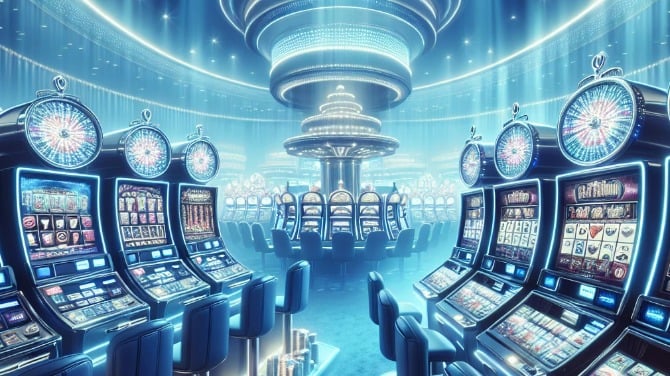Slot games, often synonymous with flashing lights, spinning reels, and the tantalizing promise of fortune, have long captivated the hearts and minds of players worldwide. However, beyond the surface-level entertainment, lies a realm rich with history, innovation, and psychological intrigue. In this article, we delve deep into the world of slot deposit qris 5000 tanpa potongan games, exploring their evolution, their impact on players, and the secrets behind their enduring appeal.
The Evolution of Slot Games: The roots of slot games can be traced back to the late 19th century when the first mechanical slot machine, known as the “Liberty Bell,” was invented by Charles Fey. This simple yet ingenious device consisted of three spinning reels adorned with symbols such as horseshoes, bells, and playing card suits. With the pull of a lever, players could set the reels in motion, hoping to land a winning combination.
Over the decades, slot machines underwent a series of transformations, evolving from mechanical contraptions to electronic marvels. The introduction of video slots in the 1970s revolutionized the industry, paving the way for immersive themes, elaborate graphics, and interactive bonus features. Today, the advent of online slots has further expanded the reach of these games, allowing players to enjoy them anytime, anywhere, from the convenience of their devices.
The Psychology of Slot Games: At the core of slot games lies a finely tuned psychological mechanism designed to engage players and keep them coming back for more. One of the most potent psychological principles at play is the concept of intermittent reinforcement. Unlike traditional forms of gambling, where the outcome is immediately apparent, slot machines offer unpredictable rewards at irregular intervals. This creates a sense of anticipation and excitement, driving players to continue spinning the reels in pursuit of elusive jackpots.
Furthermore, slot games often employ various visual and auditory stimuli to enhance the gaming experience. Bright colors, catchy sound effects, and celebratory animations are strategically deployed to evoke positive emotions and reinforce desired behaviors. The mesmerizing nature of these stimuli can sometimes lead players into a trance-like state known as the “zone,” where they lose track of time and become completely absorbed in the game.
The Social Dimension: Contrary to popular belief, slot games are not solely a solitary pursuit. Many modern slot machines feature multiplayer functionalities, allowing friends to compete against each other or collaborate towards common goals. Online slot communities and forums further facilitate social interaction, providing players with a platform to share strategies, exchange tips, and celebrate their wins together.
Moreover, the rise of social casinos has blurred the lines between gambling and casual gaming, attracting a diverse audience ranging from seasoned gamblers to casual players seeking entertainment. These platforms offer a wide array of slot games alongside other social features such as virtual gifts, leaderboards, and tournaments, fostering a sense of camaraderie among participants.
The Future of Slot Games: As technology continues to advance at a rapid pace, the future of slot games holds limitless possibilities. Virtual reality (VR) and augmented reality (AR) are poised to revolutionize the gaming experience, transporting players to immersive worlds where they can interact with their favorite slots in unprecedented ways. Blockchain technology, with its emphasis on transparency and decentralization, may also disrupt the industry by offering provably fair games and secure payment solutions.
Furthermore, the integration of artificial intelligence (AI) and machine learning algorithms could personalize the gaming experience based on individual preferences and behavior patterns. By analyzing vast amounts of data, AI-powered slot machines could dynamically adjust their gameplay mechanics, offering tailored bonuses, and rewards to maximize player engagement.


